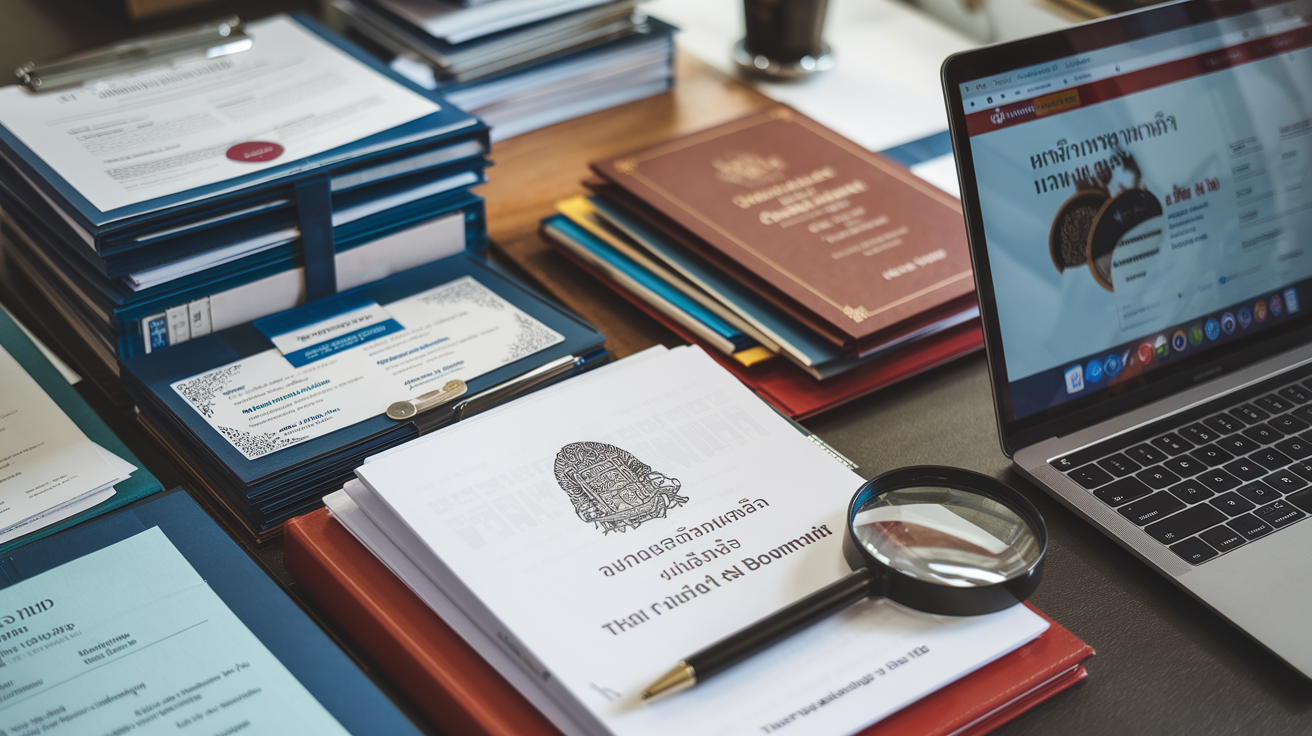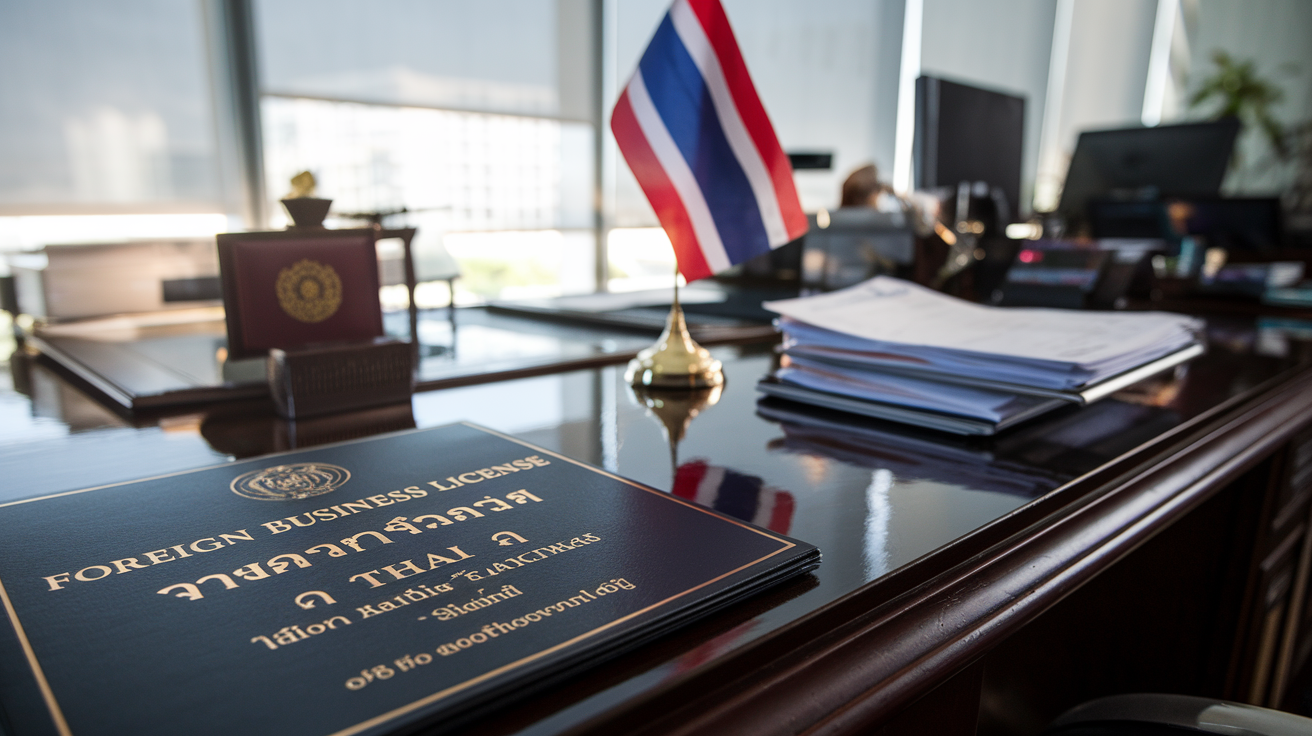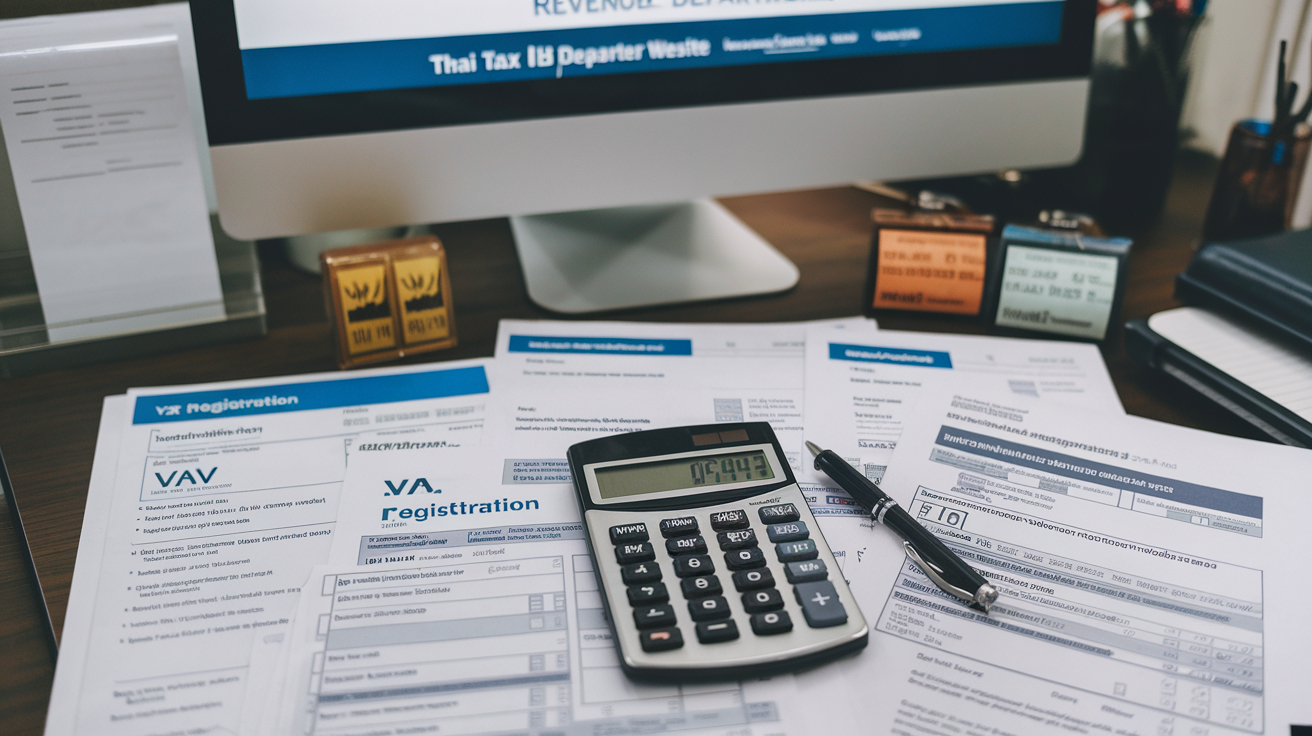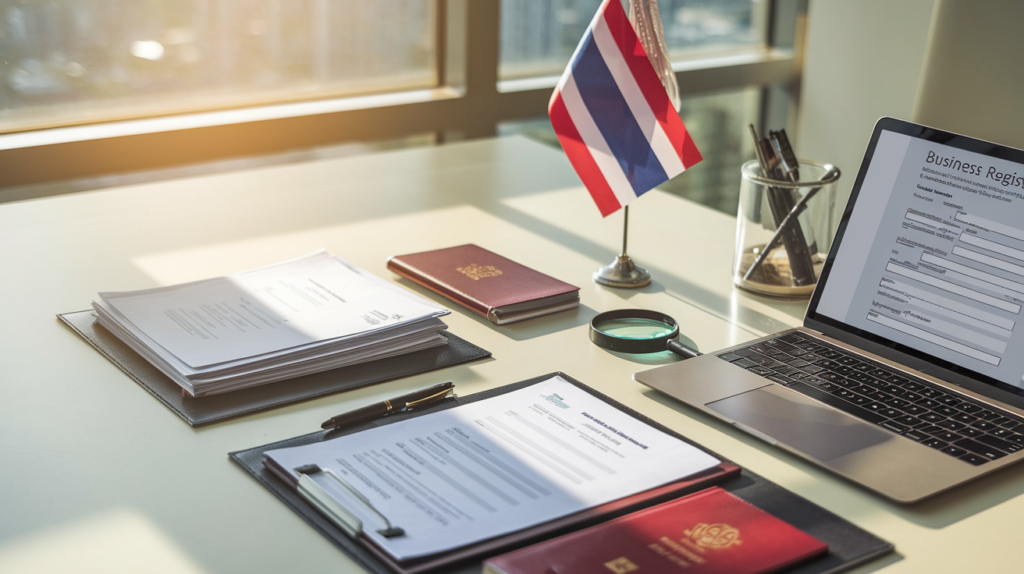Are you ready to embark on your entrepreneurial journey in Thailand? 🇹🇭 The Land of Smiles offers a wealth of opportunities for business-minded individuals, but navigating the registration process can be daunting. One wrong move, and you could find yourself tangled in a web of bureaucratic red tape.
Don’t let paperwork crush your dreams! Understanding the key documents required for business registration in Thailand is crucial to ensuring a smooth start. From essential personal documents to intricate financial records, each piece of paper plays a vital role in legitimizing your venture. But fear not – we’ve got you covered.
In this comprehensive guide, we’ll walk you through the seven categories of documents you’ll need to successfully register your business in Thailand. We’ll explore everything from company registration forms to tax documents, and even delve into the specific requirements for foreign entrepreneurs. So, let’s dive in and unlock the secrets to hassle-free business registration in the Land of Smiles! 🔑📁
Essential Personal Documents

A. Valid passport
A valid passport is the cornerstone of personal documentation for business registration in Thailand. It serves as your primary form of identification and is essential for various processes. Here are key points to remember:
- Validity: Ensure your passport is valid for at least 6 months beyond your intended stay.
- Copies: Prepare multiple copies of your passport’s photo page and any relevant visa pages.
- Notarization: Some processes may require notarized copies of your passport.
B. Non-immigrant visa
A non-immigrant visa is crucial for foreigners planning to conduct business in Thailand. Consider the following:
- Visa types: Choose the appropriate non-immigrant visa category (e.g., B for business, O for retirement).
- Duration: Non-immigrant visas typically allow stays of 90 days to 1 year.
- Extension: You may need to extend your visa depending on your business activities.
C. Work permit (if applicable)
If you plan to work in Thailand, a work permit is mandatory. Key points include:
- Eligibility: You must have a non-immigrant visa to apply for a work permit.
- Application process: Work permits are usually obtained after company registration.
- Restrictions: Work permits are specific to your job and employer.
D. Tax identification number
A tax identification number (TIN) is essential for financial transactions and tax compliance. Here’s what you need to know:
- Application: Obtain your TIN from the Revenue Department.
- Usage: Your TIN is required for various business and personal financial activities.
| Document | Purpose | Validity |
|---|---|---|
| Passport | Primary identification | At least 6 months beyond stay |
| Non-immigrant visa | Legal stay for business | 90 days to 1 year |
| Work permit | Legal employment | Tied to employment contract |
| Tax ID number | Financial transactions and tax compliance | Permanent |
With these essential personal documents in order, you’ll be well-prepared to proceed with the next steps in your business registration process in Thailand.
Company Registration Documents

A. Memorandum of Association
The Memorandum of Association is a crucial document that outlines the fundamental aspects of your company. It includes:
- Company name
- Registered office address
- Business objectives
- Capital structure
- Names of initial shareholders
This document serves as the company’s constitution and must be filed with the Department of Business Development.
B. Articles of Association
The Articles of Association detail the internal rules and regulations governing your company’s operations. Key elements include:
- Shareholder rights and responsibilities
- Board of directors’ powers and duties
- Procedures for meetings and voting
- Share transfer regulations
C. List of shareholders
A comprehensive list of shareholders is essential, containing:
| Information | Description |
|---|---|
| Full names | As per official identification |
| Nationalities | For each shareholder |
| Addresses | Current residential addresses |
| Number of shares | Held by each shareholder |
| Share values | In Thai Baht |
D. Company name reservation
Before registration, you must reserve your company name with the Department of Business Development. This process involves:
- Checking name availability
- Submitting a reservation request
- Receiving approval (valid for 30 days)
E. Certificate of incorporation
Once all documents are submitted and approved, you’ll receive the Certificate of incorporation, which officially establishes your company as a legal entity in Thailand. This document includes:
- Company registration number
- Date of incorporation
- Registered capital
- Business type
Remember to keep all these documents safely, as they’ll be crucial for future business operations and compliance requirements.
Financial Documents

Bank statements
When registering a business in Thailand, providing bank statements is crucial. These documents serve as proof of financial stability and credibility. Typically, you’ll need to submit:
- Personal bank statements (for the past 3-6 months)
- Business bank statements (if transferring an existing business)
Bank statements should clearly show:
- Account holder’s name
- Account number
- Transaction history
- Current balance
| Type of Statement | Purpose | Required Period |
|---|---|---|
| Personal | Prove personal financial stability | 3-6 months |
| Business | Demonstrate business viability | 6-12 months (if applicable) |
Proof of capital investment
Thai authorities require evidence of sufficient capital to start and operate your business. This typically includes:
- Proof of funds transfer into a Thai bank account
- Capital deposit slip
- Bank certification of the deposited amount
The minimum capital requirement varies based on the type of business and whether foreign ownership is involved.
Financial projections
To demonstrate the viability of your business, you’ll need to provide financial projections, including:
- Projected income statement
- Cash flow forecast
- Balance sheet projection
These projections should cover at least the first three years of operation and include:
- Revenue estimates
- Operating expenses
- Profit margins
- Break-even analysis
Financial projections help authorities assess the potential success and sustainability of your business in Thailand. With these documents prepared, you’ll be well-equipped to move forward with your business registration process.
Business-Specific Documents

Business plan
A well-crafted business plan is crucial for registering your company in Thailand. It serves as a roadmap for your business and demonstrates your commitment to potential investors and government officials. Your business plan should include:
- Executive summary
- Company description
- Market analysis
- Organization and management structure
- Products or services offered
- Marketing and sales strategy
- Financial projections
| Section | Key Elements |
|---|---|
| Executive Summary | Brief overview of the business |
| Company Description | Mission, vision, and objectives |
| Market Analysis | Target market, competitors, and industry trends |
| Organization Structure | Management team and roles |
| Products/Services | Detailed description of offerings |
| Marketing Strategy | Promotion and sales tactics |
| Financial Projections | Revenue forecasts and expense estimates |
Lease agreement or property ownership documents
To register your business in Thailand, you must provide proof of a physical business location. This can be in the form of:
- Lease agreement for rented premises
- Property ownership documents if you own the business location
Ensure that your lease agreement or ownership documents include:
- Complete address of the property
- Terms of the lease (if applicable)
- Signatures of all parties involved
- Official stamp or seal (if required)
Licenses for specialized industries
Depending on your business type, you may need additional licenses or permits. Some industries that require special licenses include:
- Food and beverage
- Tourism and hospitality
- Import/export
- Manufacturing
- Financial services
Research the specific requirements for your industry and obtain the necessary licenses before proceeding with business registration. This demonstrates compliance with Thai regulations and ensures a smooth registration process.
Thai Partner Requirements

Thai shareholder information
When registering a business in Thailand, it’s crucial to understand the requirements for Thai partners. For most business types, Thai nationals must hold at least 51% of the company shares. Here’s a list of essential information required for Thai shareholders:
- Full legal name
- Thai ID card number
- Current residential address
- Contact information (phone and email)
- Occupation and employment details
Partnership agreement
A well-drafted partnership agreement is vital for defining the roles and responsibilities of all parties involved. This document should include:
- Profit-sharing arrangements
- Decision-making processes
- Dispute resolution mechanisms
- Exit strategies
Here’s a basic template for a partnership agreement:
| Section | Description |
|---|---|
| Parties | Names and details of all partners |
| Contributions | Financial and non-financial contributions of each partner |
| Profit/Loss Distribution | How profits and losses will be shared |
| Management | Decision-making processes and responsibilities |
| Dispute Resolution | Methods for resolving conflicts |
| Termination | Conditions and procedures for ending the partnership |
Proof of Thai citizenship
To verify the Thai citizenship of your partners, you’ll need to provide official documentation. Acceptable forms of proof include:
- Thai national ID card (บัตรประจำตัวประชาชน)
- Thai passport
- House registration (ทะเบียนบ้าน)
- Birth certificate (if born in Thailand)
It’s important to ensure all documents are current and valid. Having these documents ready will streamline the registration process and demonstrate compliance with Thai business regulations. As we move forward, we’ll explore the requirements for obtaining a Foreign Business License, which may be necessary depending on your specific business activities in Thailand.
Foreign Business License (if applicable)

Application form
When applying for a Foreign Business License in Thailand, the first crucial document is the application form. This form, available from the Department of Business Development, requires detailed information about your company and proposed business activities.
Here’s a breakdown of key sections typically included in the application form:
| Section | Required Information |
|---|---|
| Company Details | Legal name, registration number, address |
| Shareholder Information | Names, nationalities, and shareholding percentages |
| Business Description | Detailed explanation of planned activities |
| Investment Details | Amount of foreign investment, capital structure |
| Employment Information | Number of Thai and foreign employees |
Remember to fill out the form accurately and completely to avoid delays in processing.
Business operations details
This section requires a comprehensive description of your planned business activities in Thailand. Be specific about:
- Products or services you’ll offer
- Target market and customer base
- Operational processes and methodologies
- Management structure and key personnel roles
Technology transfer plan
For many foreign businesses, demonstrating a commitment to technology transfer is crucial. Your plan should outline:
- Specific technologies or know-how you’ll introduce to Thailand
- Training programs for Thai employees
- Collaborations with local educational institutions or businesses
- Long-term plans for developing local expertise
Economic and social benefits statement
Finally, you’ll need to articulate how your business will contribute to Thailand’s economy and society. Consider including:
- Job creation projections
- Anticipated contribution to GDP
- Plans for community engagement or corporate social responsibility initiatives
- Any unique benefits your business brings to the Thai market or society
Tax Registration Documents

VAT registration form
To complete your business registration in Thailand, you’ll need to register for Value Added Tax (VAT) if your annual turnover exceeds 1.8 million baht. The VAT registration form, known as Por Por 01, is a crucial document in this process. Here’s what you need to know:
-
Form Details: The Por Por 01 form requires information about your business, including:
- Company name and address
- Nature of business
- Estimated annual turnover
- Bank account details
-
Submission Timeline: Submit the form within 30 days of reaching the VAT threshold or before starting business operations if you expect to exceed the threshold.
| Document | Submission Deadline | Authority |
|---|---|---|
| Por Por 01 | Within 30 days of threshold or before operations | Revenue Department |
Corporate income tax registration
After registering for VAT, the next step is to register for corporate income tax. This process involves:
- Obtaining a tax ID number
- Registering for e-filing of tax returns
- Understanding tax payment schedules
Social security fund registration
Lastly, businesses must register with the Social Security Office within 30 days of hiring their first employee. This registration ensures compliance with labor laws and provides benefits to employees. Key points include:
- Registration Form: Submit the SSO 1-01 form
- Required Documents:
- Company registration certificate
- VAT registration certificate
- List of employees
Remember, timely registration for these tax-related documents is crucial to avoid penalties and ensure smooth business operations in Thailand.

Navigating the business registration process in Thailand requires careful preparation and a thorough understanding of the necessary documentation. From personal identification to company registration forms, financial statements, and industry-specific permits, each document plays a crucial role in establishing your business legally and efficiently. For foreign entrepreneurs, additional requirements such as partnering with Thai nationals or obtaining a Foreign Business License may apply, adding another layer to the registration process.
Ensuring you have all the required documents in order before beginning the registration process can save you time, money, and potential legal complications. By familiarizing yourself with these key documents and seeking professional assistance when needed, you’ll be well-equipped to launch your business venture in Thailand successfully. Remember, proper documentation is not just a bureaucratic hurdle but a foundation for your business’s legal and operational integrity in the Thai market.

